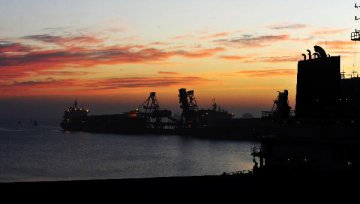Moody's Investors Service, an American credit rating agency, said on Wednesday that its outlook for financial institutions in China is stable for 2019.
Moody's said that a recent shift in China's monetary policy stance would support broad system liquidity and general repayment capacity among borrowers, but also slow the nascent decline in system leverage over the past year.
"The key risk to our stable outlook for financial institutions in China over the next 12 months remains an escalation in the trade dispute between China and the U.S., which could spill over to financial markets through disruption to global supply chains and investment fund outflows," said Nicholas Zhu, a Moody's vice president and senior analyst.
Moody's conclusions are contained in its just-released report titled "Financial Institutions - China: 2019 Outlook".
The report explains that Moody's holds a stable outlook through 2019 for the six sectors in China's financial industry, namely banks, distressed asset management companies, leasing companies, securities companies, life insurance companies, and property & casualty (P&C) insurance companies.
With the banks, Moody's said that asset quality would stay stable, with nonperforming loan ratios and credit costs elevated, but not deteriorating.
"Funding and liquidity conditions will also stabilize. The risk for the banks will come from further escalations in trade frictions between China and the U.S., which would weaken the Chinese economy and prompt policies which would affect the banks' loan underwriting standards," said the report.
On distressed asset management companies (AMCs), Moody's said that the four state-owned AMCs would continue to play a leading and strategic role in helping financial institutions and corporations dispose of their distressed assets.
However, Moody's expected a slower pace of asset growth among the four, as they returned their focus to their core business of distressed asset management and curtailed the growth in non-core investments and financial subsidiaries.
Moody's also said that the new capital regulations would improve the industry's capital management.
"As for leasing companies, their asset quality remains stable, supported by the booming aircraft leasing business and large exposures to government-related entities and state-owned enterprises which have better credit profiles. But certain overcapacity sectors, such as coal mining and energy, face pressure," according to the report.
Moreover, according to the report, profitability is pressured by higher funding costs. Nonetheless, liquidity and refinancing risks are mitigated by the recent shift to a more accommodative policy stance and by the funding support from these companies' parent banks.
"For securities companies, their profitability and asset performance will remain at risk of declining equity market volume and index level, as well as stock-pledged lending," said the report.
Nonetheless, Moody's said these firms' leverage remained low versus global peers, and they continued to maintain abundant liquidity. "The regulator has also strengthened rules on risk control, liquidity management and capital adequacy, thereby adding to the firms' resilience in adverse market conditions."
With life insurance companies, Moody's report said that continued economic growth, low insurance penetration and initiatives to promote long-term products would support insurance demand, despite slower premium growth from a shift in product mix, which will improve underwriting margins and cash flow.
"While overall asset risks have moderated because a slight decline in alternative investments, a loosening of certain regulations such as those on equity investments could reverse this trend," said the report.
As for the P&C insurance companies, Moody's said their underwriting profit would stay stable, because of regulations to curb the growth in aggressive acquisition expenses. "These companies' stable profitability will support their capitalization, and capital erosion risk from alternative investments will be contained".























Latest comments